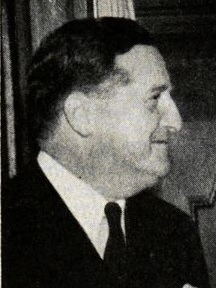Herschel Johnson
 | |
| Born | May 3, 1894 Atlanta, Georgia, U.S. |
| Died | April 16, 1966 (Age 71) Charlotte, North Carolina, U.S. |
| Nationality | US |
| Alma mater | University of North Carolina Chapel Hill, Harvard University |
| Party | Democratic Party (United States) |
Herschel Vespasian Johnson was a U.S. diplomat from North Carolina.[1] He was the great grandson of Governor Herschel Vespasian Johnson.[2] He was a U.S. Foreign Service Officer from 1921 to 1953, and his career included posts in Europe, Latin America, and the United Nations.
He was Envoy Extraordinary and Minister Plenipotentiary to Sweden between 12 December 1941 and 28 April 1946. Thereafter, he served as the acting US ambassador to the United Nations between 1946 and 1947.
During his time As Ambassador neutral Sweden during World War 2, he was in touch with Raoul Wallenberg[3]. One of his duties was to discourage, as far as possible, Swedish exportation of strategic industrial materials to Germany. During the war years the legation grew from 40 to about 300, all of whom had to be airlifted in and out. The burgeoning staff had work to do in the country that served as "listening post" and "hotbed for intrigues of all the belligerants."[2]
In April 1945 it was Johnson who handled the delicate communications in connection with Heinrich Himmler's separate peace proposal, which had come via Count Folke Bernadotte of the Swedish Red Cross.
He was a vocal proponent of the 1947 Palestine Partition Plan. The outcome of the UN vote is attributed to his collaboration with Andrei A. Gromyko, otherwise Johnson's political opponent. They both stood together on this issue and urged the General Assembly not to delay its decision but to vote for partition at once, opposing last-minute efforts of Arab delegations to effect a compromise.
In 1948, he was appointed Ambassador Extraordinary and Plenipotentiary to Brazil. There he was in charge of negotiating US aid programs for Brazilian economic development and signed numerous bilateral agreements, including technical cooperation and a military assistance pact.[2] The military assistance pact, which included provisions for cooperative economic defense and commercial controls, was not immediately embraced by all parties in Brazil.[2]
He was a freemason and a member of the Metropolitan Club of Washington, D.C.[2]
References
- ↑ Herschel Vespasian Johnson (1894-1966). Office of the Historian, Bureau of Public Affairs, United States Department of State. Retrieved July 13, 2013.
- ↑ a b c d e https://www.ncpedia.org/biography/johnson-herschel
- ↑ https://www.diva-portal.org/smash/get/diva2:394016/FULLTEXT01.pdf